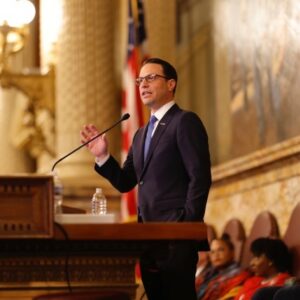Pennsylvania Gov. Josh Shapiro presented his first budget Tuesday, laying out $44.4 billion in spending for fiscal year 2023 in a lengthy speech to legislators.
Shapiro acknowledged divided politics would make passing any proposal more challenging, but he urged legislators to look beyond partisanship.
“Pennsylvania is one of only two states with a divided legislature,” said Shapiro. “Together, we represent many Pennsylvanians who also divided their vote… Through their ballots, they asked us implicitly to come to the table, put aside the partisan litmus tests, and deliver commonsense solutions to the very real problems that we are facing every day.”
Shapiro’s proposed budget increases spending on education as a response to a Commonwealth Court decision, spending on mental health services for students, emphasizes vocational-technical training and incentives for new police officers, nurses, and teachers to address shortages in those jobs.
“Policing is a noble profession and good people want to do it,” said Shapiro, the former state attorney general.
The proposed budget includes a $567.4 million increase or 7.8 percent for basic education and an increase of $103.8 million for special education. He also proposes taxpayer-funded free breakfast for all public school children.
Shapiro would expand the property tax and rent rebate program for seniors and the disabled. He would also eliminate the state cell phone tax, which equals 11 percent of cell phone bills.
A new program would spend $10 million on public defenders and improve probation and parole programs to improve the state’s 64 percent recidivism rate.
Other plans would eliminate regulatory red tape for new businesses and he also urged the legislature to hasten the pace of planned business tax reductions, so companies relocate to Pennsylvania rather than other states.
“I am competitive as hell, and I am sick and tired of losing to other states,” Shapiro said.
The general fund surplus and the rainy fund are the largest in the state’s history, he noted. Their budget is based on conservative revenue estimates, he said.
However, state Republicans said, if adopted, this budget would spend down the state’s reserves and lead to future tax increases by introducing new ongoing programs without revenue streams to fund them.
Reactions from Delaware Valley politicos were largely positive from both sides of the aisle.
“After hearing the Governor’s budget address, I believe there are many areas where we will find common ground and some significant places where continued work is needed,” said Sen. Tracy Pennycuick (R-Bucks/Montgomery). “I was pleased that the governor chose to support several important family and senior-centric programs. I would have liked to have seen renewed commitment towards Lifeline scholarships and Educational Improvement Tax Credit Program (EITC) expansion to ensure that children have additional avenues to obtain a high-quality education.”
Rep. Kristin Marcell (R-Bucks), who serves on the appropriations committee said, “While I look forward to working with the governor to pass a fiscally responsible commonsense budget, how we get there is critical. The governor’s plan to deplete our budget reserves and the Rainy Day Fund is concerning. With economists projecting an economic slowdown, if not a recession, it is imperative we preserve these funds to manage any revenue shortfalls.”
Sen. Frank Farry (R-Bucks) liked some of what Shapiro proposed, including more for mental health services and removing state police funding from the transportation funding stream. He is also in favor of “right-sizing” higher education and investing in public schools.
Democratic legislators applauded Shapiro.
Sen. Amanda Cappelletti (D-Montgomery) tweeted, “Our minimum wage in PA is shameful. We must #RaiseTheWage and ensure our workers have what they need to provide for themselves and their families. I’m glad to hear @GovernorShapiro call for a $15 minimum wage during today’s budget address.”
But Commonwealth Foundation Vice President Nate Benefield said called the proposed budget “disappointing, giving the bipartisan issues Shapiro campaigned on” such as working with the legislature on getting the state out of the Regional Greenhouse Gas Initiative (RGGI), which increases electricity costs to consumers, and on school choice.
And he said as for the recent court ruling on education funding, Shapiro is wrong.
The recent education funding lawsuit ruling didn’t order “more money”.
“In fact, Pennsylvania already spends $4,000 per student more than the national average, even before last year’s record increase,” said Benefield. “What the ruling said was that every student must get a ‘meaningful opportunity.’ The only way to deliver this is through educational choice. But Gov. Shapiro walked back on his campaign promise to expand educational opportunity and instead throws money at the same broken system.”
Republican commentator Guy Ciarrocchi urged Republicans to seize the opportunity to pass GOP priorities Shapiro claims to embrace.
“Shapiro stated he wants to make it easier to get permits and licenses; eliminate the cell phone tax; cut business taxes and make it easier for students to learn trades for careers. These are commonsense ideas that the GOP has been fighting for. Pass those bills and put them on his desk—and, help the citizens of Pennsylvania,” Ciarrocchi said.
Please follow DVJournal on social media: Twitter@DVJournal or Facebook.com/DelawareValleyJournal

